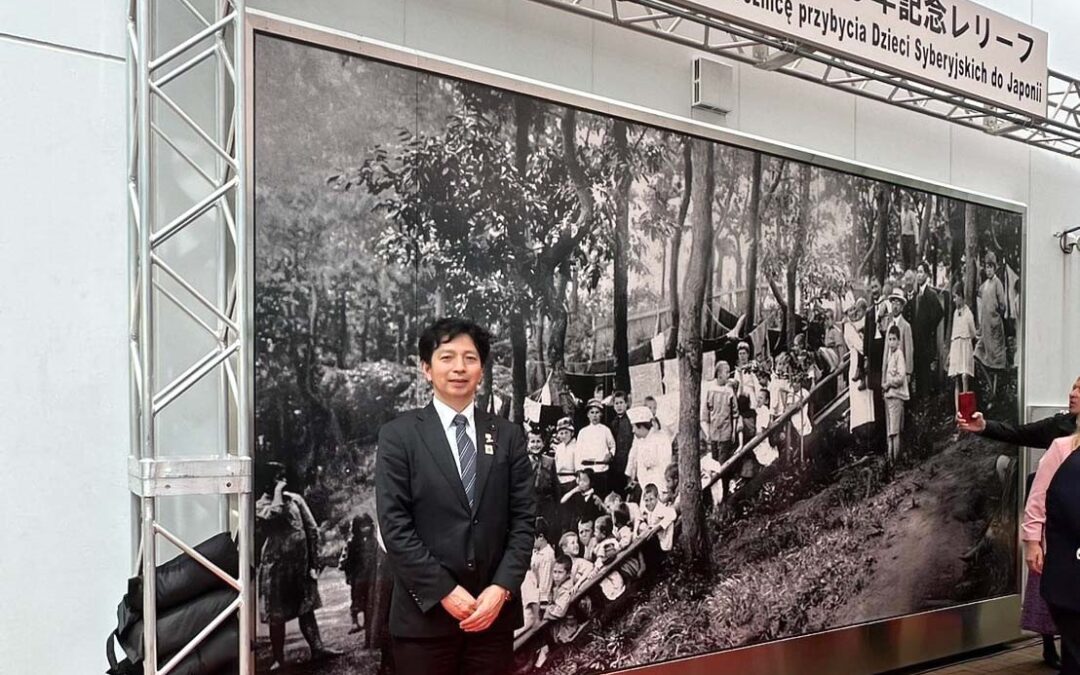A ceramic relief sculpture has been unveiled in Japan to commemorate the hundreds of Polish orphans who were cared for in Tokyo after being evacuated from Siberia in Russia a century ago.
The ceremony was attended by descendants of the rescued Polish children, who reenacted a photograph of their ancestors. Japan’s Princess Hisako Takamado also participated in the event and a letter from Poland’s President Andrzej Duda expressing gratitude to Japan was read.
In 1919, the Polish Rescue Committee for Children in the Far East was established in the Russian city of Vladivostok. Its aim was to evacuate ethnic Polish orphans who were facing a difficult situation in Siberia after the Russian Revolution and subsequent outbreak of the Polish-Soviet War.
Before 1918, Poland had not existed as a country, instead being partitioned between Germany, Austria-Hungary and Russia. Many of the Polish children in Siberia were descendants of Polish political exiles sent there under Russian rule. Others were the offspring of Poles working on construction of the Trans-Siberian Railway.
After the creation of an independent Polish state in 1918, a war with the emerging Soviet Union broke out and lasted until 1921.
That made it “impossible to transport [the children] to Poland, because the enemy was near Warsaw and threatening the whole country”, notes Poland’s Institute for National Remembrance (IPN). “[But] to leave them in Siberia was impossible, because the war and anarchy would have condemned the children to certain doom.”
This week marks the centenary of the Battle of Warsaw, at which Poland inflicted a decisive defeat on the Soviet Red Army and changed the course of European history.
Norman Davies explains the battle's causes, course and consequences https://t.co/NGUvgxOkKG
— Notes from Poland 🇵🇱 (@notesfrompoland) August 12, 2020
Instead, between 1920 and 1922 over 800 Polish children were evacuated from the Russian Far East. The aim was to bring them to the United States, where they would be cared for by the large Polish community before moving on to Poland once it was safe to do so.
But the first stop was Japan, where the Japanese government and Red Cross provided help in not only transporting the children but also giving them medical care, housing and other forms of support while they were in the country.
Fukudenkai orphanage in Tokyo, which had been established by Buddhists in the 19th century, took in a group of almost 400 Polish children and housed them for a few months.
After receiving care there, in 1921 the refugees were transported to Seattle and then on to Chicago, where they were supported by, among others, Polish pianist, composer and independence activist Jan Ignacy Paderewski. The following year, the children were resettled in Poland.
Last week, a ceramic relief depicting the Siberian orphans was unveiled at the Fukudenkai social welfare centre. It is based on a photograph from the archives of the Japanese Red Cross showing some of the Polish children.
To mark the unveiling, a group of over 30 descendants of those refugee children – now living in Poland, Canada, the UK, the US and Australia – posed for a similar photograph.
One of those present, Paweł Hałaburdzin, whose grandfather Piotr, then aged 15, had been among those rescued, told Polskie Radio how moving it was to “see places that were part of my grandfather’s life”. He and other descendants visited a local Catholic church, a zoo and a Buddhist temple.
「シベリア孤児来日100年記念式典及びレリーフ除幕式」に出席しました。
1920年から1923年にかけて、第一次世界大戦とロシア革命後の混乱の中で親を亡くしたシベリアのポーランド孤児765名を日本赤十字社が救済したそうです。… pic.twitter.com/fxg4yMrwUG
— 田中たくみ 渋谷区議会議員 (@tanakatakumi15) May 31, 2024
In a letter read at the ceremony, President Duda expressed Poland’s gratitude to Japan for the help it provided to the orphans, reports Polish state broadcaster TVP.
After the arrival of the first group of Polish children at Fukudenkai, a second transport, of almost 400 orphans, was housed in a nurses’ dormitory at Osaka municipal hospital.
Last year, Duda’s wife, First Lady Agata Kornhauser-Duda, took part in a ceremony organised by the Japanese embassy in Warsaw to mark the centenary of the Siberian orphans’ return to Poland. Previously, in 2019, she visited Fukudenkai during a trip to Japan.
Małżonka Prezydenta RP Agata Kornhauser-Duda wzięła udział w ceremonii upamiętnienia 100. rocznicy powrotu Dzieci Syberyjskich do Polski. – Ta historia to wspaniały symbol polsko-japońskiej solidarności i przyjaźni – mówiła Pani Prezydentowa podczas uroczystości zorganizowanej… pic.twitter.com/SrEYfQ73ns
— Kancelaria Prezydenta (@prezydentpl) September 26, 2023

Notes from Poland is run by a small editorial team and published by an independent, non-profit foundation that is funded through donations from our readers. We cannot do what we do without your support.
Main image credit: Tanakatakumi15/X

Daniel Tilles is editor-in-chief of Notes from Poland. He has written on Polish affairs for a wide range of publications, including Foreign Policy, POLITICO Europe, EUobserver and Dziennik Gazeta Prawna.



















